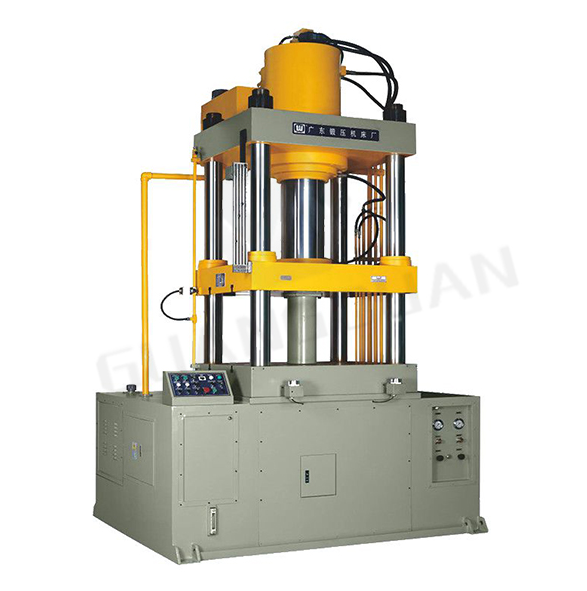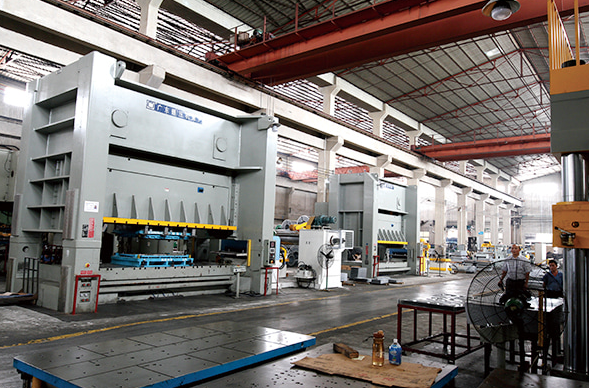
Future-Proofing Manufacturing: Large-Scale Press Equipment
Large-scale press equipment, exemplified by GUANGDUAN’s innovative solutions, continues to play a pivotal role in motor manufacturing industries worldwide. The ability to achieve precision, enhance efficiency, and adapt to technological advancements positions these machines as indispensable assets in modern industrial settings. Looking ahead, ongoing advancements in technology and a focus on sustainability promise to further elevate the capabilities of large-scale press equipment, driving innovation and shaping the future of manufacturing across diverse sectors.

Introduction to Large-Scale Press Equipment
What is Large-Scale Press Equipment?
Large-scale press equipment refers to machinery designed for heavy-duty industrial applications, primarily used in shaping and forming materials through high-pressure force. These machines are pivotal in manufacturing for their ability to exert immense pressure on raw materials, transforming them into precise components used across various industries.
Key Features and Capabilities
The main features of large-scale press equipment include robust hydraulic or mechanical systems capable of generating significant force. These machines often integrate advanced control systems for precise operation and safety. They are adaptable to different manufacturing processes, from simple stamping to complex forming operations required in modern industrial production.
Industry Relevance
Industries such as stainless steel ware and motor manufacturing heavily rely on large-scale press equipment. In stainless steel ware manufacturing, these presses are integral for forming intricate shapes and ensuring uniformity in products. Similarly, motor manufacturing utilizes press equipment for producing components like chassis parts, engine components, and body panels with high precision and efficiency.
Benefits of Large-Scale Press Equipment
Increased Efficiency
Large-scale press equipment enhances production efficiency by automating repetitive tasks and achieving high output rates. This results in reduced manufacturing lead times and lower operational costs due to minimized material waste and improved workflow management.
Precision and Quality
One of the significant advantages of large-scale press equipment is its ability to maintain exceptional precision in forming operations. Whether shaping stainless steel components or intricate motor parts, these machines ensure consistent quality that meets stringent industry standards.
Versatility in Material Handling
These presses are versatile in handling various materials, ranging from stainless steel and aluminum to composites and plastics. Their adaptability extends to forming complex shapes, such as deep draws and multiple bends, crucial for diverse industrial applications.
Applications in Stainless Steel Ware Manufacturing
Specific Forming Processes
In stainless steel ware manufacturing, large-scale press equipment is employed in processes like deep drawing, blanking, and bending. These processes are essential for creating items such as kitchen sinks, utensils, and industrial containers, where precise shaping and durability are critical.
Advantages Over Traditional Methods
Compared to traditional methods like casting or machining, large-scale press equipment offers advantages such as higher production speeds, lower material costs through efficient use, and greater design flexibility. These factors contribute to cost-effective manufacturing without compromising product quality.
Case Studies
For instance, GUANGDUAN’s large-scale press equipment has been pivotal in the production of stainless steel sinks for commercial kitchens. By integrating advanced hydraulic systems and precise die tooling, GUANGDUAN presses ensure consistent thickness and smooth finishes, meeting the exacting demands of both domestic and international markets.
Applications in Motor Manufacturing Industries
Large-scale press equipment plays a crucial role in the production of motor components, enabling manufacturers to achieve precision and efficiency in their operations.

Component Production
In motor manufacturing, large-scale press equipment is primarily used for forming and shaping essential components such as engine blocks, transmission gears, and chassis parts. These machines utilize high tonnage capacities to exert immense pressure on materials like steel and aluminum, transforming them into complex shapes with minimal material waste. The ability to create intricate geometries ensures that motor components meet stringent performance and safety standards required in automotive applications.
Efficiency Gains
The adoption of large-scale press equipment in motor manufacturing results in significant efficiency gains. By automating repetitive forming processes and reducing setup times, these machines enhance production throughput and minimize labor costs. Manufacturers can achieve higher output rates while maintaining consistent product quality, thereby improving overall operational efficiency and competitiveness in the market.
Innovation and Technology
Recent advancements in large-scale press equipment have introduced innovative technologies tailored to the needs of motor manufacturing. For instance, digital control systems allow for precise adjustment of press parameters, ensuring optimal performance and minimal downtime. Hydraulic and servo-driven presses offer superior control over force application, contributing to better part quality and dimensional accuracy. These technological innovations not only improve production capabilities but also enable manufacturers to innovate new designs and integrate advanced materials into motor components.
Factors to Consider When Choosing Large-Scale Press Equipment
Selecting the right large-scale press equipment involves evaluating several critical factors that align with industrial requirements and operational goals.
Capacity and Size
The capacity and size of the press equipment are pivotal considerations based on the scale of manufacturing operations and the size of components being produced. Manufacturers in the motor industry often require presses with high tonnage capacities to handle thick materials and form large parts like engine blocks. The versatility to accommodate varying sizes of dies and tooling setups is essential for maximizing production flexibility and efficiency.
Automation and Control
Automation features and advanced control systems significantly impact the performance and usability of large-scale press equipment. Integrated automation reduces reliance on manual labor, improves safety by minimizing operator interaction with moving parts, and enhances overall production consistency. Sophisticated control interfaces provide real-time monitoring of press parameters, enabling operators to adjust settings promptly to optimize forming processes and ensure quality standards are met.
Maintenance and Support
The reliability of large-scale press equipment depends on proactive maintenance practices and responsive customer support. Manufacturers should consider the ease of maintenance, availability of spare parts, and the provider’s service network when selecting equipment. Regular maintenance routines prolong equipment lifespan, minimize unexpected downtime, and ensure continuous productivity in motor manufacturing operations.
Future Trends and Innovations in Large-Scale Press Equipment
As technology evolves, future trends in large-scale press equipment are poised to transform manufacturing capabilities and sustainability efforts in various industries.
Technological Advancements
Emerging technologies such as artificial intelligence (AI) and machine learning are being integrated into large-scale press equipment to optimize performance and predict maintenance needs. AI-driven algorithms analyze data from sensors and historical operation records to enhance process control and efficiency. Additionally, advancements in material science are enabling presses to handle new materials and composites, expanding the scope of applications in motor manufacturing and beyond.
Industry 4.0 Integration
The concept of Industry 4.0, characterized by interconnectedness and smart manufacturing, is influencing the development of large-scale press equipment. IoT-enabled sensors and cloud-based platforms facilitate remote monitoring of press operations, predictive maintenance, and real-time production analytics. This integration enhances operational transparency, agility in responding to market demands, and the ability to customize manufacturing processes according to specific motor industry requirements.
Environmental Impact
Modern large-scale press equipment is designed with sustainability in mind, addressing environmental concerns through energy-efficient operation and reduced material waste. Hydraulic systems with regenerative capabilities recycle energy during press cycles, minimizing power consumption and operational costs. Furthermore, manufacturers are adopting eco-friendly lubricants and implementing recycling initiatives to minimize the environmental footprint of their production processes.
Conclusion
Large-scale press equipment, exemplified by providers like GUANGDUAN, plays a pivotal role in modern manufacturing industries such as stainless steel ware and motor manufacturing. Its ability to enhance production efficiency, ensure precision, and handle various materials makes it indispensable for meeting the complex demands of today’s markets. As technology continues to advance, these machines will likely evolve further, driving innovation and setting new standards in industrial manufacturing.
CONTACT US


Guangdong Metal Forming Machine Works Co., Ltd.
We are always providing our customers with reliable products and considerate services.
If you would like to keep touch with us directly, please go to contact us



